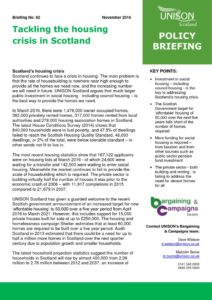* Investment in social housing – including council housing – is the key to addressing Scotland’s housing crisis.
* The Scottish Government target for ‘affordable’ housing of 50,000 over the next five years falls short of the number of homes required
* More funding for social housing is required – from taxation and from other sources such as public sector pension fund investment
* The private sector – both building and renting – is failing to address the need for decent homes for all
Scotland’s housing crisis
Scotland continues to face a crisis in housing. The main problem is that the rate of housebuilding is nowhere near high enough to provide all the homes we need now, and the increasing number we will need in future. UNISON Scotland argues that much larger public investment in social housing – including council housing – is the best way to provide the homes we need.
In March 2016, there were 1,476,000 owner occupied homes, 382,000 privately rented homes, 317,000 homes rented from local authorities and 278,000 housing association homes in Scotland. The latest House Conditions Survey (2014) shows that
840,000 households were in fuel poverty, and 47.5% of dwellings failed to reach the Scottish Housing Quality Standard. 48,000 dwellings, or 2% of the total, were below tolerable standard – in other words not fit to live in.
The most recent housing statistics show that 167,122 applicants were on housing lists at March 2016 – of which 24,600 were waiting for a transfer and 142,500 were waiting to enter social housing. Meanwhile the market continues to fail to provide the scale of housebuilding which is required. The private sector is building virtually half the number of houses it was prior to the economic crash of 2008 – with 11,917 completions in 2015 compared to 21,679 in 2007.
UNISON Scotland has given a guarded welcome to the recent Scottish government announcement of an increased target for new ‘affordable housing’ to 50,000 over a five year period from April 2016 to March 2021. However, this includes support for 15,000 private houses built for sale at up to £250,000. The housing and homelessness campaign Shelter estimates that at least 60,000 homes are required to be built over a five year period. Audit Scotland in 2013 estimated that there could be a need for up to half a million more homes in Scotland over the next quarter century due to population growth and smaller households.
The latest household projection statistics suggest the number of households in Scotland will rise by almost 400,000 from 2.39 million to 2.78 million between 2012 and 2037, an increase of 17%. The projected yearly increase in the number of households is 15,820.
Public investment in social housing remains inadequate. 2,954 homes were built by housing associations in 2015, and just 1,083 by local councils. The stock of social housing has been stagnating after a long decline. The abolition of the right to buy, which ended in July 2016, was an important step but it now needs to be followed up with a massive expansion of social housing.
Funding for social housing
In the face of financial constraints, UNISON would argue that the Scottish government should begin to exercise some of its new powers including taxation to provide more resources for investing in social and council housebuilding. Local councils should use their prudential borrowing powers for this purpose.
We agree that other innovative funding sources should be used as well. Our proposal to use Scotland’s public sector pension funds to invest in public housing in our report ‘Funding and Building the Homes Scotland Needs’ was developed with the support of the Scottish Federation of Housing Associations. Scotland’s public sector pension funds manage around £30 billion of assets – some of which could be put to constructive use with Registered Social Landlords providing low risk and socially useful investment, instead of investing billions in overseas equities, arms companies, tobacco firms and fossil fuels. There has been some limited take up of this proposal – led by Falkirk’s Local Government Pension Scheme Fund with an investment in 300 new homes in their area – and we continue to urge the Scottish government to do more to make it happen widely.
Private rented sector
Private renting has been growing quickly in Scotland since the economic crash of 2008, in the absence of sufficient social housing. Private sector rent levels have been increasing at some of the highest rates in the UK and are now double the cost of social housing. This is particularly acute in some cities. Security of tenure issues and often poor quality of accommodation, maintenance and repair have also been increasing problems for private tenants.
UNISON supported some of the provisions enacted in the Private Housing Act 2016 including moves to improve security of tenure – however we are in favour of stronger regulation including rent controls. The new ministerial powers to establish rent pressure zones will be welcome if they are used to mitigate rent levels in the worst cases. However, they are not a substitute for a proper system of rent control – along with improved regulation of landlords and decent housing standards.
Further information:
UNISON Scotland Housing campaign page
www.unison-scotland.org/campaigns/housing/
Funding and building the homes Scotland needs
www.unison-scotland.org/library/FundingAndBuilding TheHomesScotlandNeeds_Mar2013.pdf
Making homes for a Fairer Scotland
www.unison-scotland.org/library/MakingHomesForAFairerScotland_June2013.pdf
Open the door – the homes we need
www.unison-scotland.org/library/OpenTheDoor_TheHomesWeNeed_Oct2014.pdf
Evidence to Scottish Parliament on Housing Supply Budget
www.unison-scotland.org/library/DraftBudget2017-18_UNISONScotlandEvidencetoScotParlLocalGovtCttee_Oct2016.pdf

